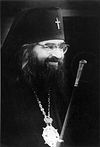

| Previous day | Next day |
| Old Style
June 19
|
Saturday |
New Style
July 2
|
|
2nd Week after Pentecost.
Tone 8.
Fast of the Holy Apostles. |
Fish, wine and oil allowed.
|
![]() Holy Apostle Jude, the Brother of the Lord (ca. 80).
Holy Apostle Jude, the Brother of the Lord (ca. 80). ![]() St. Job, patriarch of Moscow (1607).
St. Job, patriarch of Moscow (1607). ![]() St. John (Maximovitch), archbishop of Shanghai and San Francisco (1966).
St. John (Maximovitch), archbishop of Shanghai and San Francisco (1966).
Martyr Zosimas the Soldier, at Antioch in Pisidia (ca. 89-117). St. Paisius the Great, of Egypt (5th c.). St. John the Solitary, of Jerusalem (6th c.). St. Barlaam, monk of Shenkursk (1462). St. Paisius the Bulgarian, of Hilandar, Mt. Athos (18th c.).
Holy Myrrh-bearer Mary, mother of Apostle James (1st c.). St. Macarius of Petra (4th c.). St. Zeno, hermit, of Egypt (4th c.). St. Romuald, abbot of Camaldoli (Ravenna) (1027). Hieromartyr Asyncretus.
Repose of Schemamonk Theoktist, desert-dweller, of Valaam (1863) and Archbishop Leonty of Chile (1971).
Thoughts for Each Day of the Year
According to the Daily Church Readings from the Word of God
By St. Theophan the Recluse

Saturday. [Rom. 3:19–26; Matt. 7:1–8]
Judge not, that ye be not judged (Matt. 7:1). What a disease—gossip and judging others! Everyone knows that this is a sin; nevertheless there is nothing more common in our words than judgment of others. One says, “Do not count it as judging, O Lord,” but continues judging to the end. Another justifies himself that any reasonable person must have an opinion about what is going on, and in his gossip he tries to be coolly reasonable; but even a simple ear cannot help but discern a high-minded and gloating judgment of others in his words. Meanwhile, the sentence of the Lord for this sin is strict and decisive. He who judges others will not be justified. What should one do? How can one avoid misfortune? A decisive remedy against judging others consists of this: to consider yourself condemned. He who feels himself condemned will have no time to judge others. His only words will be, “Lord have mercy! Lord forgive my transgressions!”
Articles
 Repose of St Job the Patriarch of Moscow, and All Russia |
 Martyr Zosimus the Soldier at Antioch, in Pisidia |
 St John the Solitary of Jerusalem |







